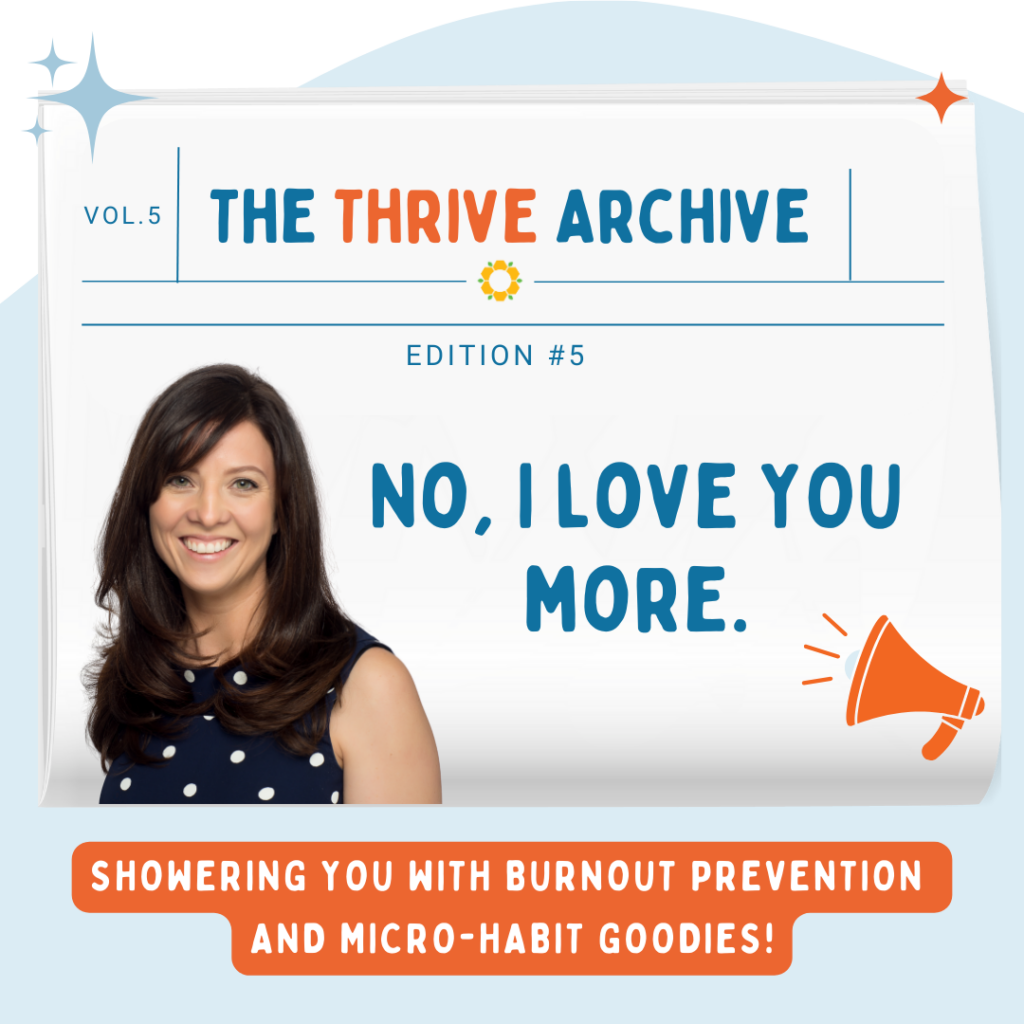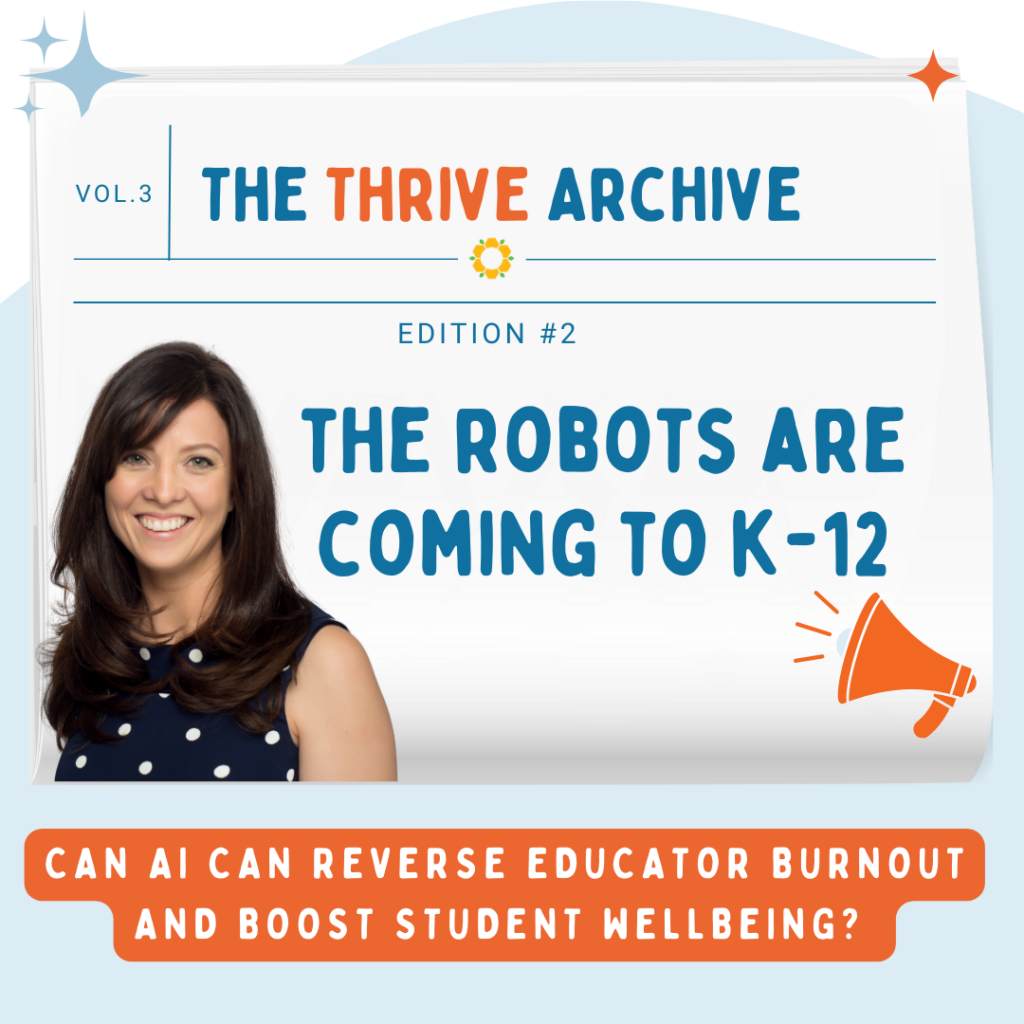- For School Psychologists, News
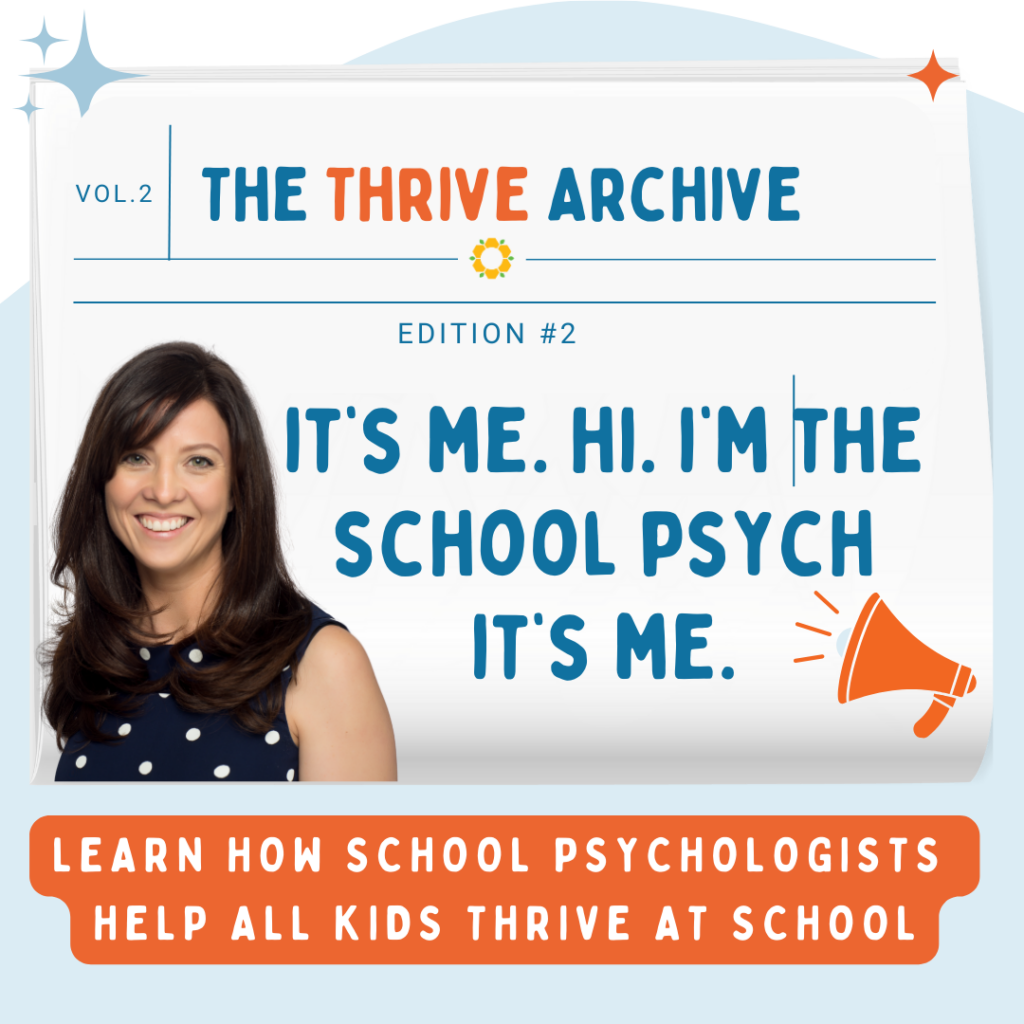
In my last Thrive Archive newsletter, I shared how to address the mental health shortages in K12 education. This month, in honor of National School Psychology Week (Nov 6-10th), I’m gonna brag on school psychologists! Read on to learn how K12 schools can best utilize school psychologists as levers for equity and access for students with disabilities and as agents for prevention and early intervention for learning and mental health challenges.
What is a School Psychologist?
Here are the two most common reactions people give me when I tell them I’m a school psychologist:
1) They have never heard of a school psychologist. Usually followed by, “So you’re like a guidance counselor? ” (Close…but no). Like a teacher? (Kind of…) A therapist? (Sort of…)
2) If they are in K12 schools they usually say, “Ohhh…you’re the lady who tests kids for special education!” (True….but not just that)
I don’t expect people to know the nuances of a school psychologist’s role, given it’s a super niche job in K12 (there’s only 35K of us in the whole United States for all public schools!).
It’s kind of like when someone tells me they’re in Tech and I don’t know much about the subsets of tech, so I lump them under the job of “Computers.”
Or, for Barbie fans out there, it’s like how Ken’s job is non-specifically “Beach”.

But school psychologists are not just “beach”! We don’t just test kids for special education. We have a diverse set of skills that you might not know about…And since it’s National School Psychology Week, I’ll proudly share what we do!
Improve Academic Achievement
- Conduct psychological and academic assessments
- Individualize instruction and interventions
- Consult with teachers to manage student behavior
Promote Positive Behavior and Mental Health
- Assess student emotional and behavioral needs
- Provide individual and group counseling
- Make referrals to and help coordinate community services provided in schools
Support Diverse Learners
- Assess diverse learning needs
- Provide culturally responsive services to students and families from diverse backgrounds
- Plan appropriate Individualized Education Programs for students with disabilities
Create Safe, Positive School Climates
- Prevent bullying and other forms of violence
- Support social-emotional learning and positive school climate
- Provide crisis prevention and intervention services
Strengthen Family-School Partnerships
- Help families understand their child’s learning and mental health needs
- Assist in navigating special education processes
- Help students transition between school and community learning environments, such as residential treatment or juvenile justice programs
Improve School-Wide Assessment and Accountability
- Generate and interpret useful student and school outcome data
- Collect and analyze data on risk and protective factors related to student outcomes
- Plan services at the district, building, classroom, and individual levels
If I’m in an elevator and only have a minute to explain all that, I say, “A school psychologist is like if a teacher and a child psychologist had a baby. And that baby majored in helping everyone in the school understand how kids learn best, what is getting in the way, and what to do about it so they can thrive at school, home, and in life.”
Why School Psychologists Are Important
One in five children has a diagnosed learning or attention challenge. Anxiety and clinical depression in children are on the rise, approaching 25% and 20% of all children, respectively. The crisis is likely even worse, as these numbers do not include any undiagnosed children.
Schools are an ideal place for children and teens to access needed support. And yet, on average in the United States, there is only one school psychologist for nearly 1200 students. In some areas, that ratio is as high as 1:5000. Beyond school psychologists, a recent report shows found we only have a third of all the mental health and special education staff we need in schools.
You know what happens when school psychologists have too many students on their caseloads?
They are relegated to only one of those many things we are trained to do: Testing students to determine special education eligibility. Or as I call the role, “Diagnose and Adios.” While it’s an important role to assess students for eligibility, it’s a fraction of our skill set, and we end up not having any time for additional prevention and early intervention.
This is important because there are so many students, especially in the wake of the pandemic, who don’t qualify for services under special education but still need special attention and support.
With shortages in school psychologists and the number of students in special education students having doubled over the past four decades, school psychologists can’t be the only holders of information about how to support students in special education and those who need intervention.
In today’s schools, every educator is a special educator.
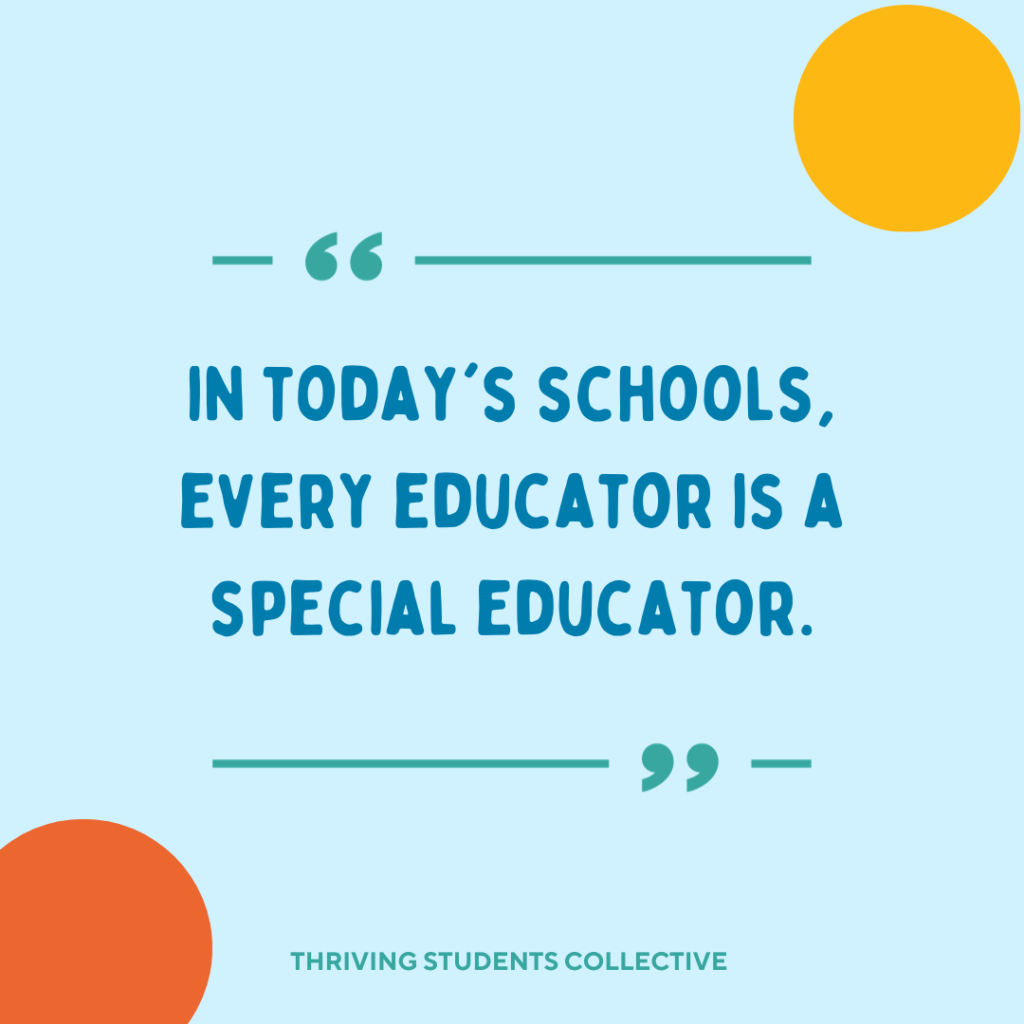
With this in mind, another important role school psychologists play in schools is educating and consulting with educators and caregivers about how to support complex learners (whether the student is officially diagnosed or not).
So how can general educators and parents learn about neurodiversity and supporting the learning needs and mental health of our students?
I am thrilled to share that this time last year, New Schools Venture Fund recognized this important mission and with a grant from their organization, we’ve built out a way to share school psychologists’ expertise in our Thrive Hive TV Network. We now have over 200 short “TikTok-like” videos to level up everyone’s understanding of how to support neurodivergent students and those experiencing mental health challenges in schools.
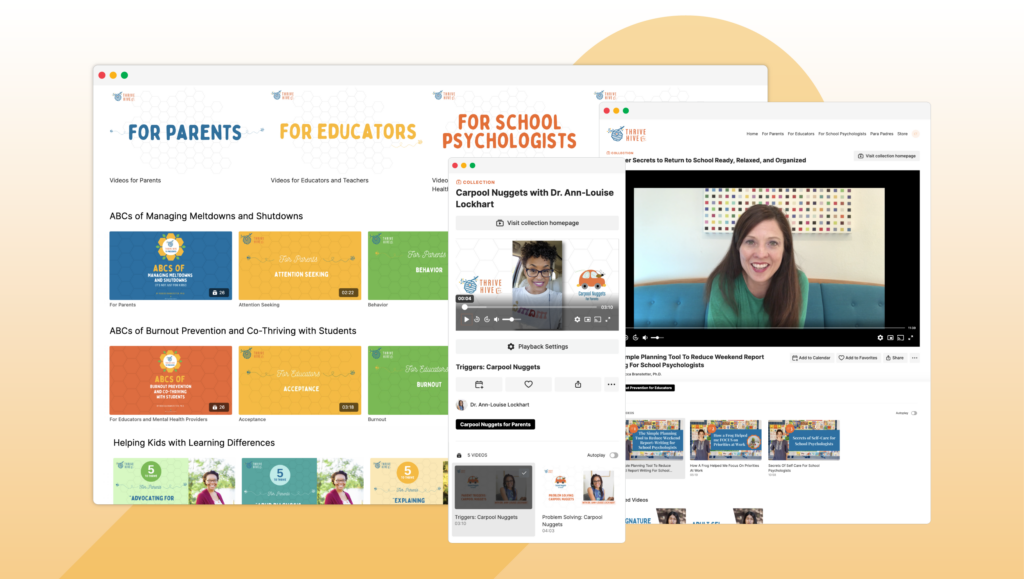
Click here for a free trial 30-day to check it out!
Celebrate with Us
Now that I’ve sufficiently bragged on school psychologists (OR HAVE I?), it’s time to celebrate our week! November 6-10th is National School Psychologist Week and I’ve created 3 free resources to celebrate and educate the work of school psychologists on this year’s theme of “Let’s Grow Together.”
Click here to get: 🍃 Growth mindset coloring page and poster! 🍃 Resilience through relationships coloring page and poster! 🍃 Free copy of the Thriving School Psychologist Book…and more!
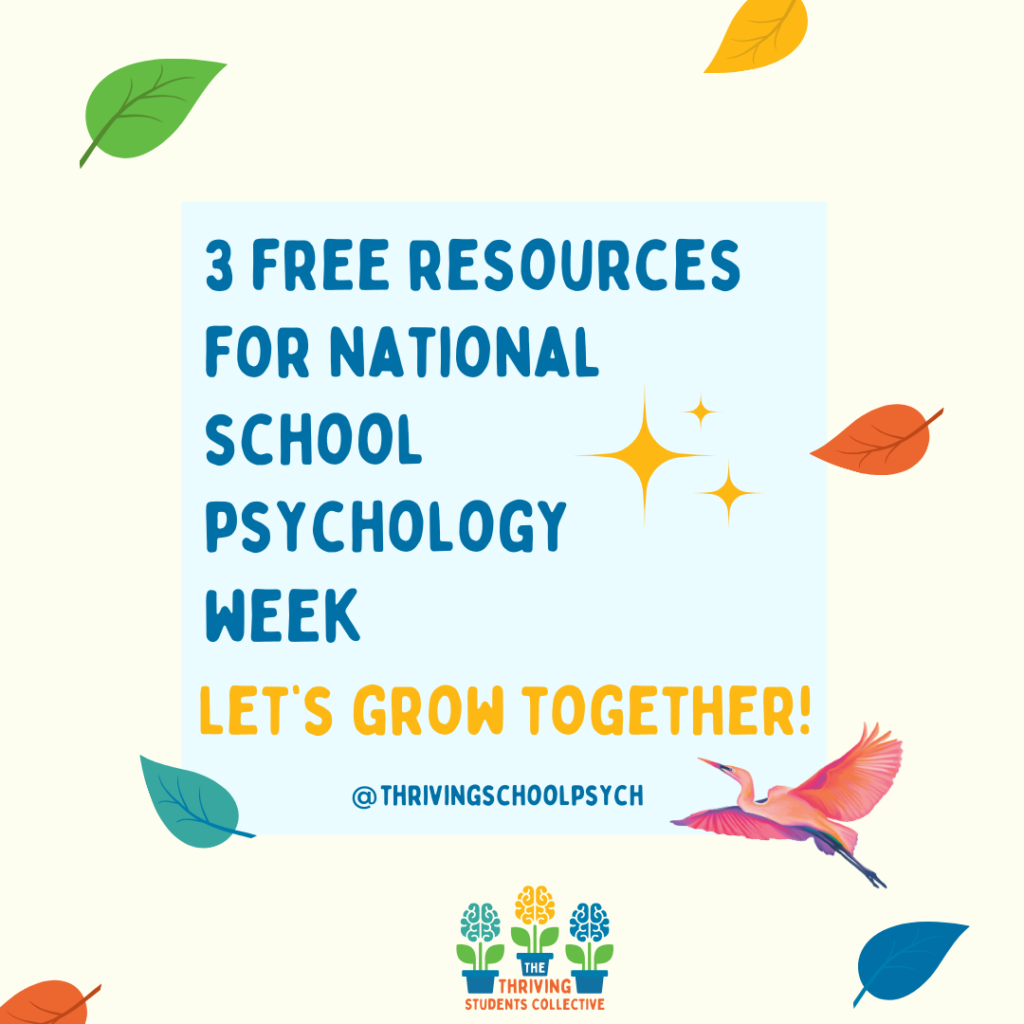
And for you school psychs out there, be sure to check out my Instagram all week for fun prizes and giveaways!
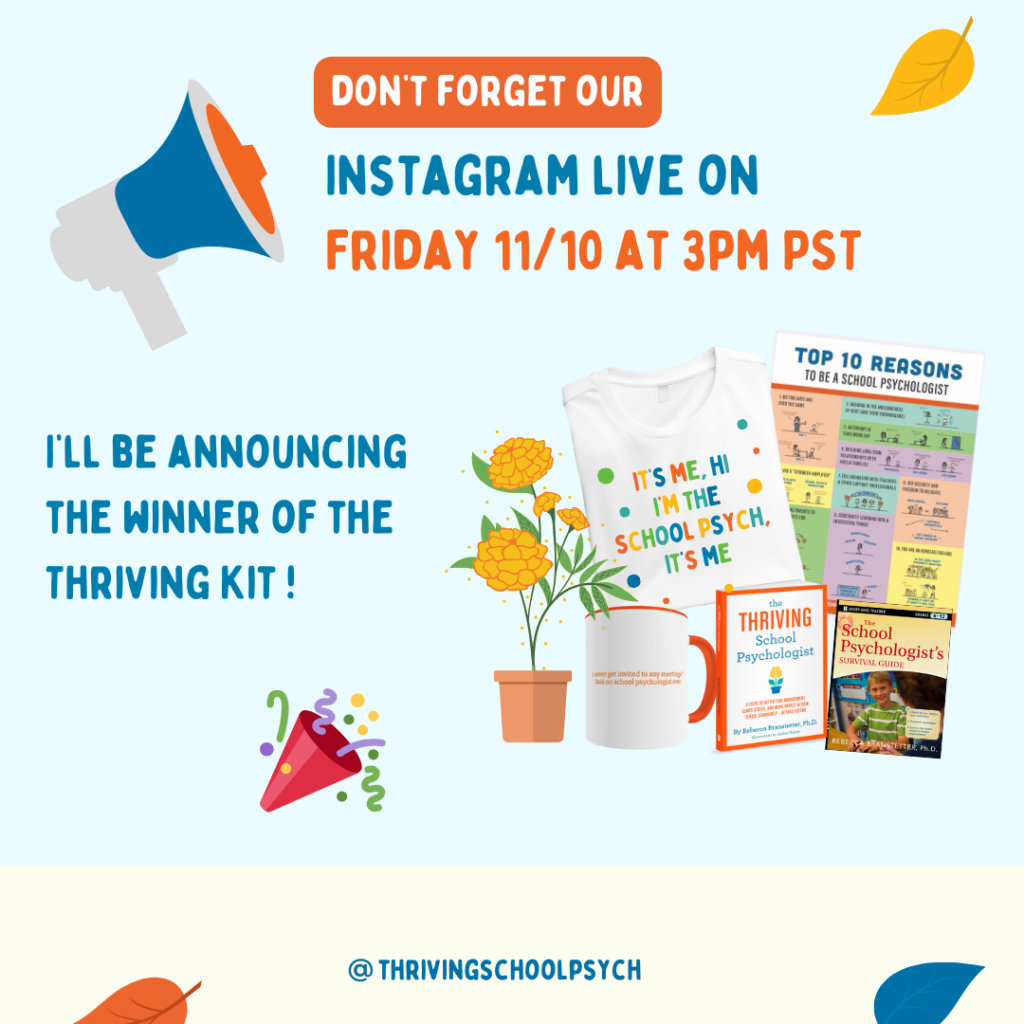
Retaining Your School Psychologists
I have the pleasure of traveling across the country presenting to schools, districts, and school psychologist organizations on how to retain and empower school psychologists and educators.
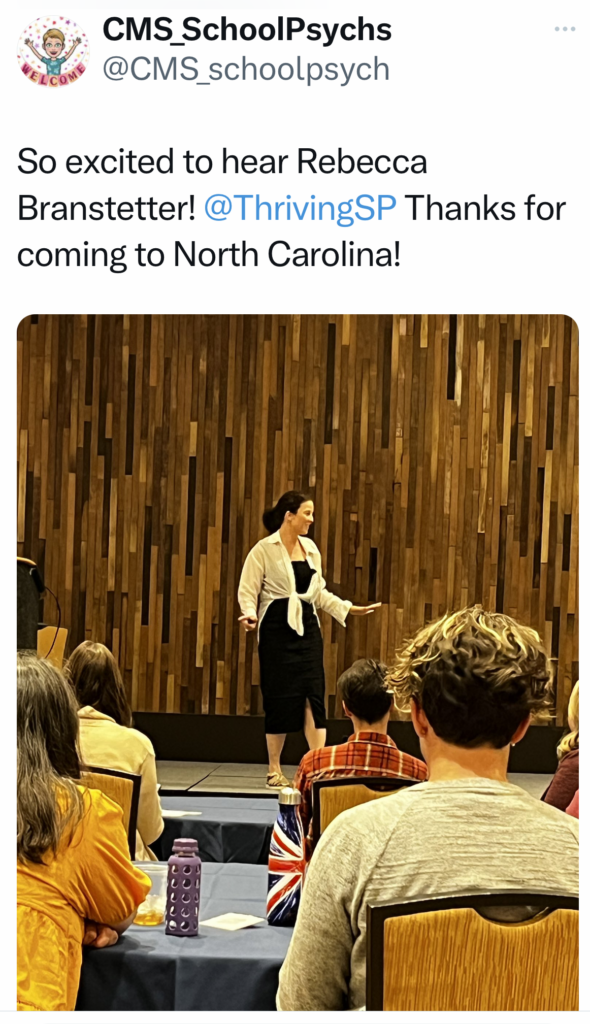
Recently, I was in North Carolina and a school psychologist told me her caseload was 4700 students. In Georgia, another said she had 3000. In Nebraska, one school psychologist had over 10 schools to cover. They didn’t have time for anything but testing and crisis management and they were all on the brink of quitting.
Over and over I hear the same thing from school psychologists…They love their students and are passionate about the work, but they aren’t sure how long they can take being overworked and underutilized as assessors.
District leaders are scrambling to fill positions, and the pipeline for more school psychologist talent is slow. That is why it’s imperative to provide our current school psychology workforce with burnout prevention support.
That’s what I set out to do in 2017 when I created the Thriving School Psychologist Collective, our signature online course and community that has been shown to reduce burnout and turnover and expand school psychologists’ roles to more preventative services.
We’ve heard from you and listened. That’s why we are opening up a special new cohort in 2024!
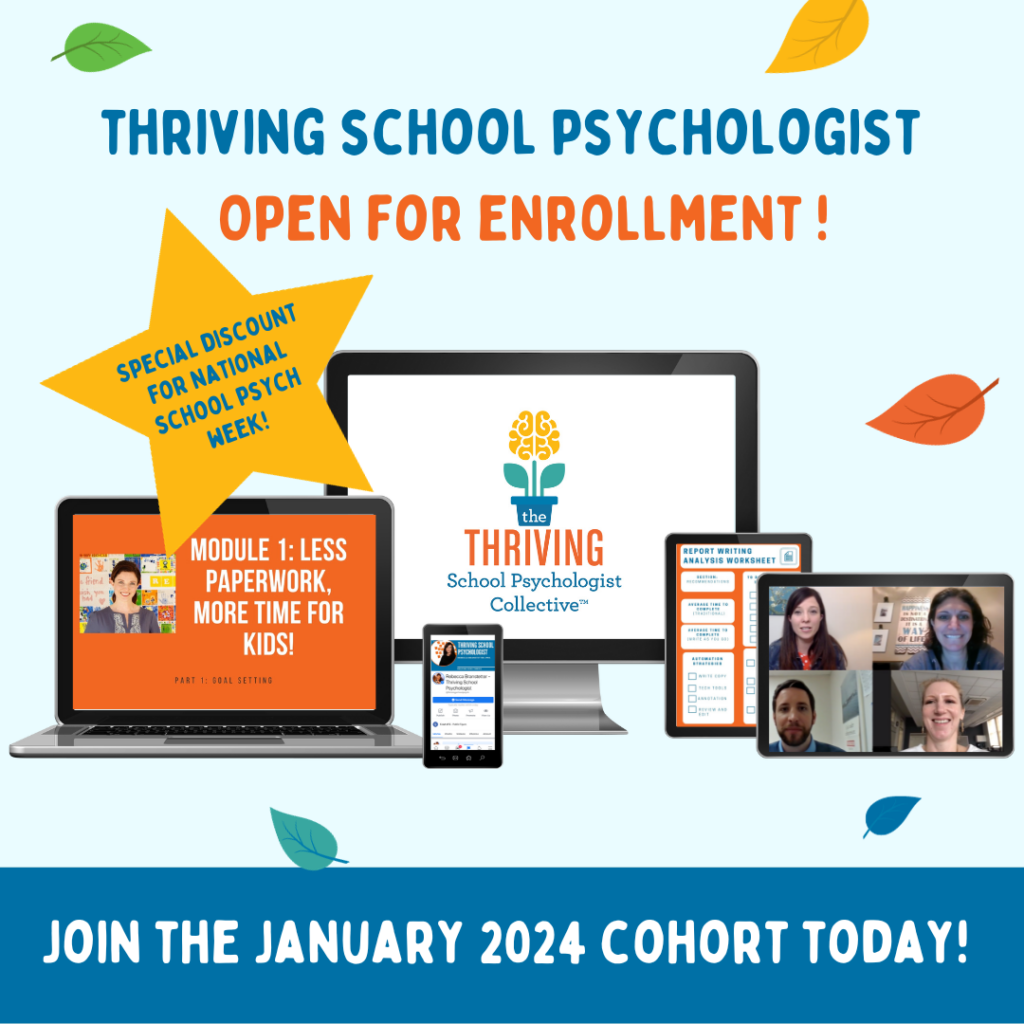
Click here to learn more (and we have a special National School Psychology Week discount and group rates for districts!)
Thriving in Action
One thing I love as much as bragging on school psychologists is bragging on school districts who support their school psychologists! This month’s “Thriving in Action” shout out goes to Fulton County School District, who got the Thriving platform for all of their school psychologists (and social workers!) to protect the wellbeing of their staff and level up their practices for neurodivergent students.
Check out their story here!
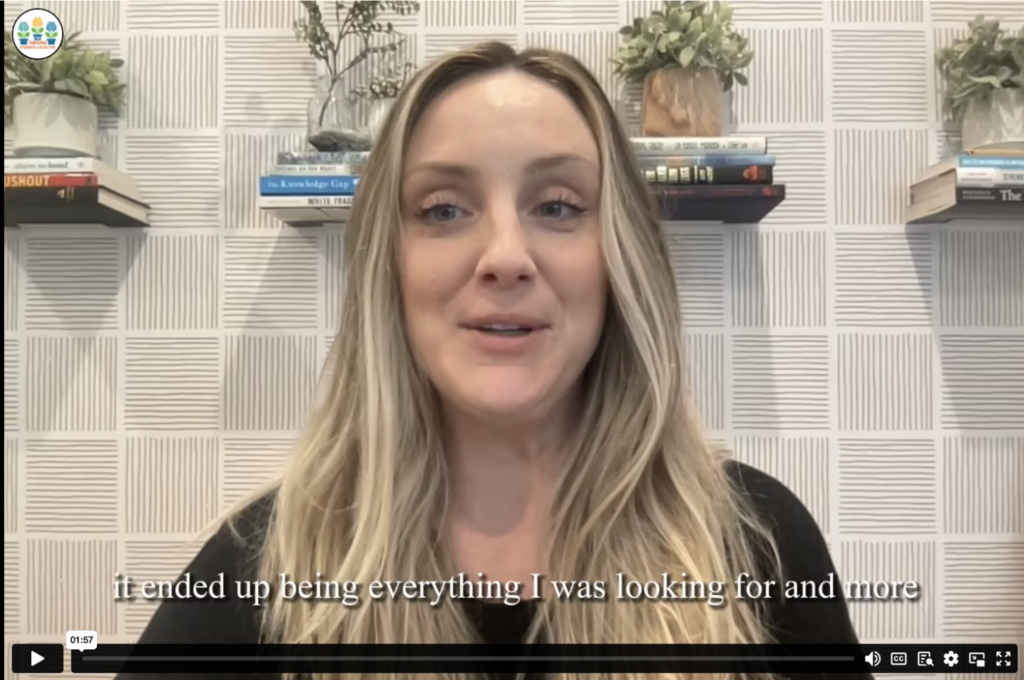
Oh! One More Thing School Psychologists Do…
Sometimes, a school psychologist will co-found an organization called the Thriving Students Collective with a mission to help schools beat educator and parent burnout and have the tools to help all students thrive. (It’s me. Hi. I’m that school psych it’s me!)
Alongside my co-founder Sarah Hauser, we are working to scale the expertise of school psychologists to everyone in the school building through educational technology, professional development, and AI-powered customized learning for adults who want to protect themselves from burnout and level up their skills.
With shortages of school psychologists, we need to both retain and empower the ones we have to move from being “testing machines” to full-service providers and empower other educators and parents to also have tools to support children with learning, behavioral, and emotional needs.
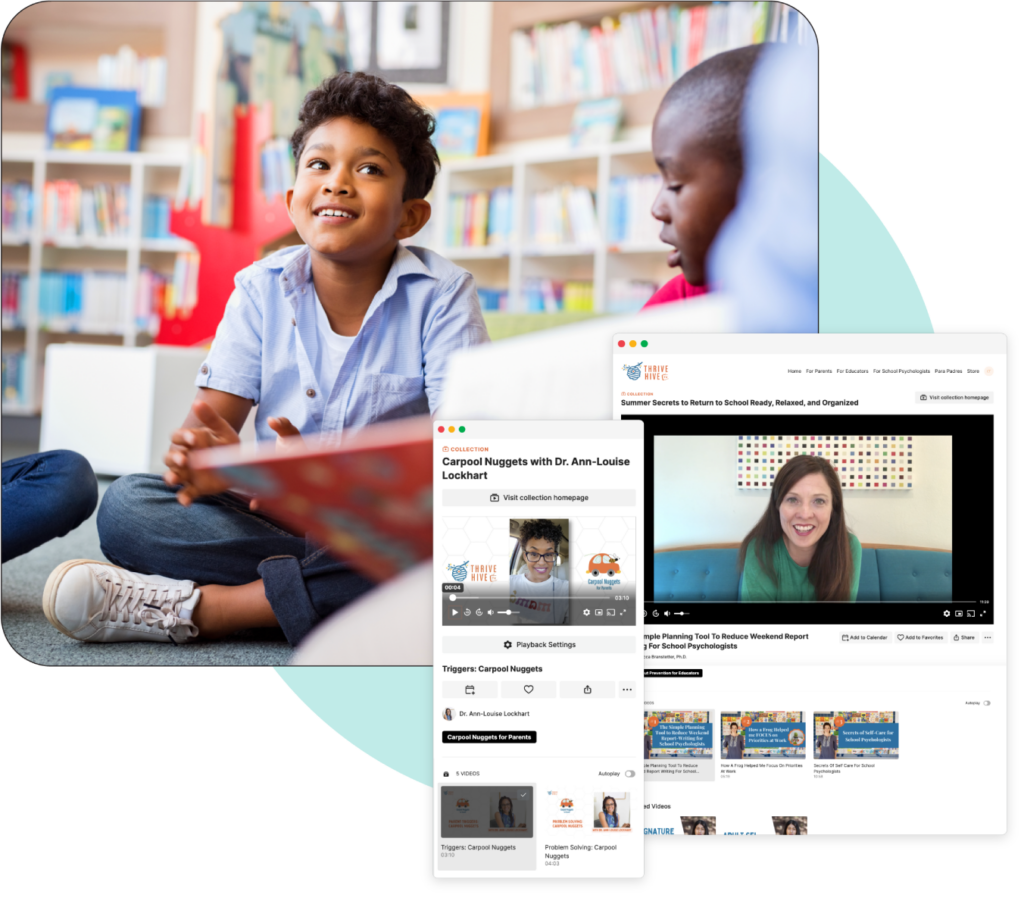
If you’re interested in learning more about the Thriving Students Platform for your school or district CLICK HERE to connect with us!
A Final Note about Humor.
Research shows that we retain 44% more content when something is humorous. Humor has positive physiological effects, such as decreasing stress hormones like epinephrine and cortisol and increasing the activation of the mesolimbic dopaminergic reward system (that delightful hormone we feel when we are winning or about to win something).
In education and helping professions, we are more prone to burnout, so sometimes we definitely need a dose of humor and fun. So I’ll end with my embarrassing TikTok on how to prevent burnout (endorsed by my middle school daughter as “Cringe, but good dancing”).
Take care,
If you’re interested in bringing Thriving Students Platform to your school or district CLICK HERE to connect with us!
Want more K12 News You Can Use? Subscribe here!
Dr. Rebecca Branstetter is a school psychologist and co-founder of The Thriving Students Collective, which provides professional development, engaging online courses, and a supportive online communitythat prioritizes whole-school wellness and equips educators and parents with practical tools to empower every learner’s success. She also has a TikTok account all about burnout prevention in K12 that her middle school daughter has endorsed as “Cringe, but good dancing.”

